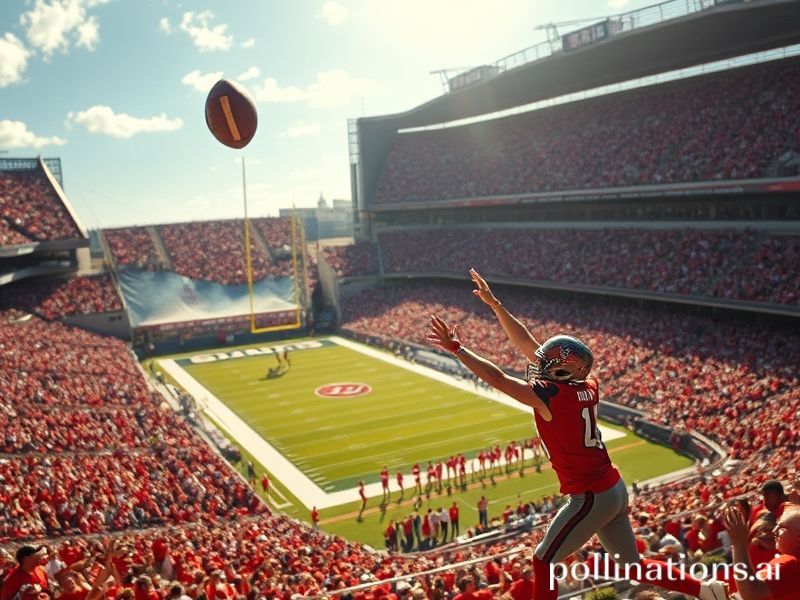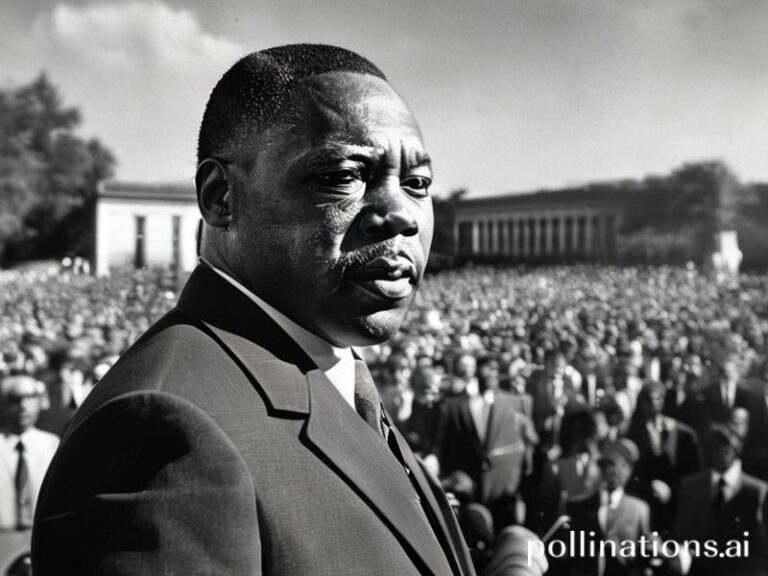Global Debt Hits $100 Trillion as Planet Watches Bucs Lose: An International Dispatch from Tampa Bay
TAMPA BAY—While artillery duels resumed near Kharkiv and the yen flirted with thirty-four-year lows, roughly 65,000 sunburned pilgrims filed into Raymond James Stadium this afternoon to discover whether the Tampa Bay Buccaneers could protect a 2-1 record against the undefeated Detroit Lions. Somewhere in the South Pacific a Kiribati fisherman mended his nets, blissfully unaware that his entire nation’s GDP is smaller than the combined salary-cap hit of two Bucs wide receivers. Such is the planetary pecking order on Game Day, when the American colossus pauses its regularly scheduled doom-scroll to scream at men in pewter helmets.
Kickoff coincided—deliciously, if you enjoy cosmic irony—with the IMF’s latest warning that global debt has breached the $100 trillion mark, a figure so cartoonish it might as well be the Bucs’ asking price for a lukewarm beer. Still, the parking-lot economy around Tampa thrived: Dominican flag vendors, Honduran grill-masters, and a lone Serbian blasting techno from a rented Mustang all cashed in on the fleeting promise of American spectacle. Their combined revenues could probably float a small sovereign state for a week, provided that state doesn’t require functioning hospitals.
Inside the stadium, the narrative arc was comfortingly familiar to anyone who has watched, say, Libyan militias realign: early optimism, catastrophic special-teams lapse, ritualistic gnashing of teeth. Baker Mayfield—an itinerant quarterback whose career path mirrors the average Syrian refugee’s, only with better agents—threw a first-quarter interception that was immediately compared, by a gentleman in a Winston jersey, to “Pearl Harbor, but worse.” Hyperbole is the last American manufacturing sector still operating at full capacity.
By halftime the Lions led 17-3, and the Jumbotron cut to U.S. service members waving from an aircraft carrier currently policing the Strait of Hormuz. The crowd erupted in the sort of patriotic fervor that conveniently papers over the fact those same sailors’ hazard pay won’t cover a family outing to this very stadium. Meanwhile in Brussels, EU defense ministers debated sending another billion euros to Kyiv; the sum equals about twelve seasons of Tom Brady’s retirement-proof contract, give or take a missile shield.
Over in the global marketplace, the NFL’s broadcast reached 180 countries via platforms ranging to full satellite packages to bootleg streams buffering in Lagos Internet cafés. A Kenyan student interviewed by the BBC explained he roots for Tampa because “pirates are romantic,” a sentiment no doubt shared by the Somali entrepreneurs whose private-sector innovations in maritime redistribution once terrorized these same shipping lanes that now deliver the Bucs’ Gatorade concentrate.
Back on the field, the fourth quarter delivered the requisite false hope: a 97-yard touchdown drive complete with fourth-down conversions, reminiscent of Greece’s annual bailout negotiations—equal parts ingenuity and desperation. Alas, with two minutes left, Mayfield’s Hail Mary died in the end zone like a UN resolution on Syrian accountability: noble trajectory, zero impact. Final score: Lions 20, Buccaneers 13. The stands emptied into humid Florida night, thousands of smartphones already glowing with highlight reels and recession alerts in equal measure.
In the broader scheme, today’s outcome alters nothing beyond fantasy-football spreadsheets and local talk-radio blood pressure. Yet it reaffirms a durable geopolitical constant: when empires decline, they still schedule entertainment. Rome had circuses; America has red-zone packages. The difference is bandwidth. Somewhere a Chinese satellite beamed the entire spectacle back to Beijing, where analysts study the NFL the way their predecessors studied Soviet rail capacity—anxiously, obsessively, and with just a hint of envy.
So the Bucs fall to 2-2, treading water in a division where .500 passes for stability. Sound familiar? Check your pension fund, your climate forecasts, your news feed. We are all, in a sense, playing for draft picks now, hoping next year’s class of saviors arrives before the salary cap of civilization kicks in. Until then, we tailgate—because the alternative is reading the balance sheet of reality, and nobody buys jerseys for that team.







